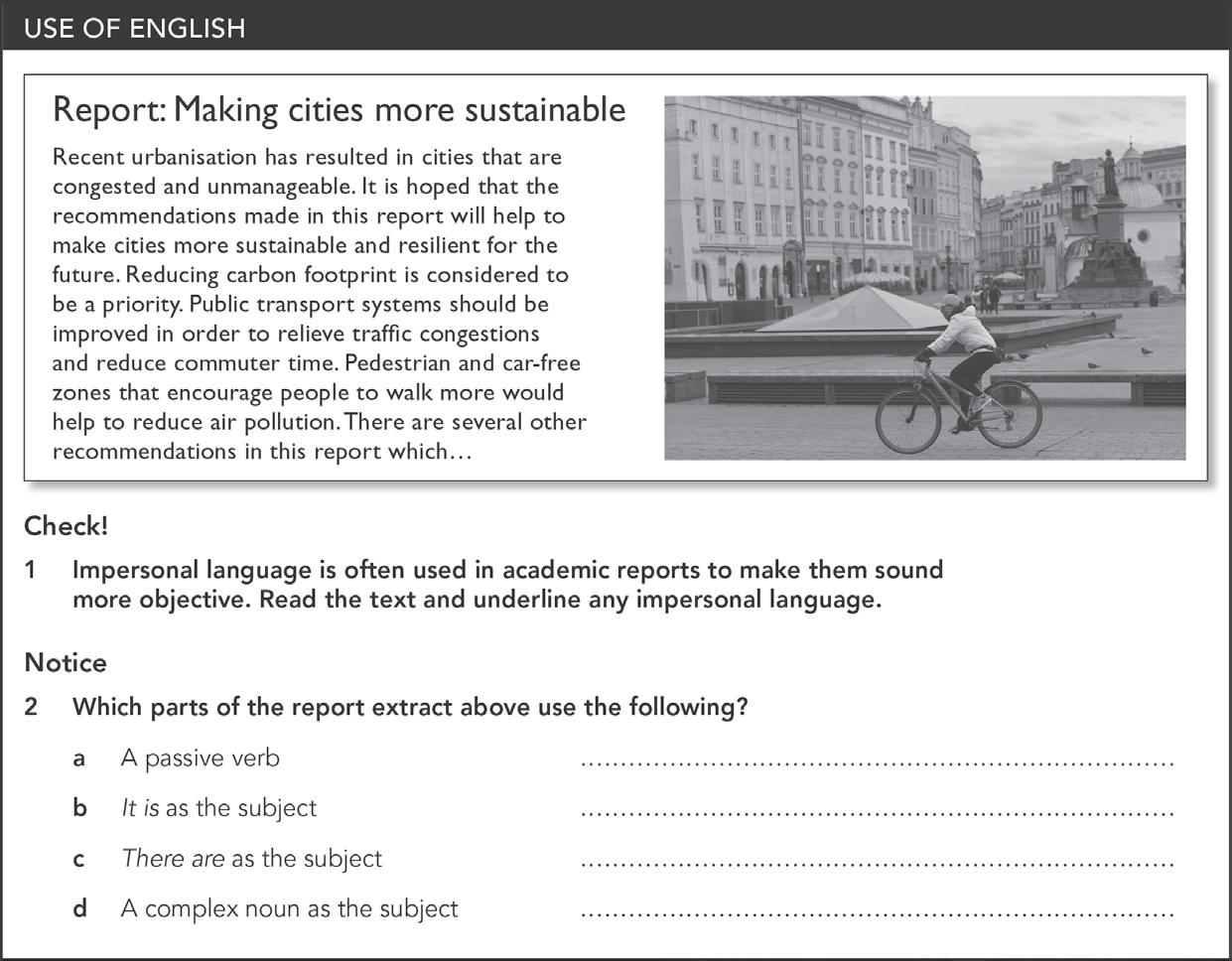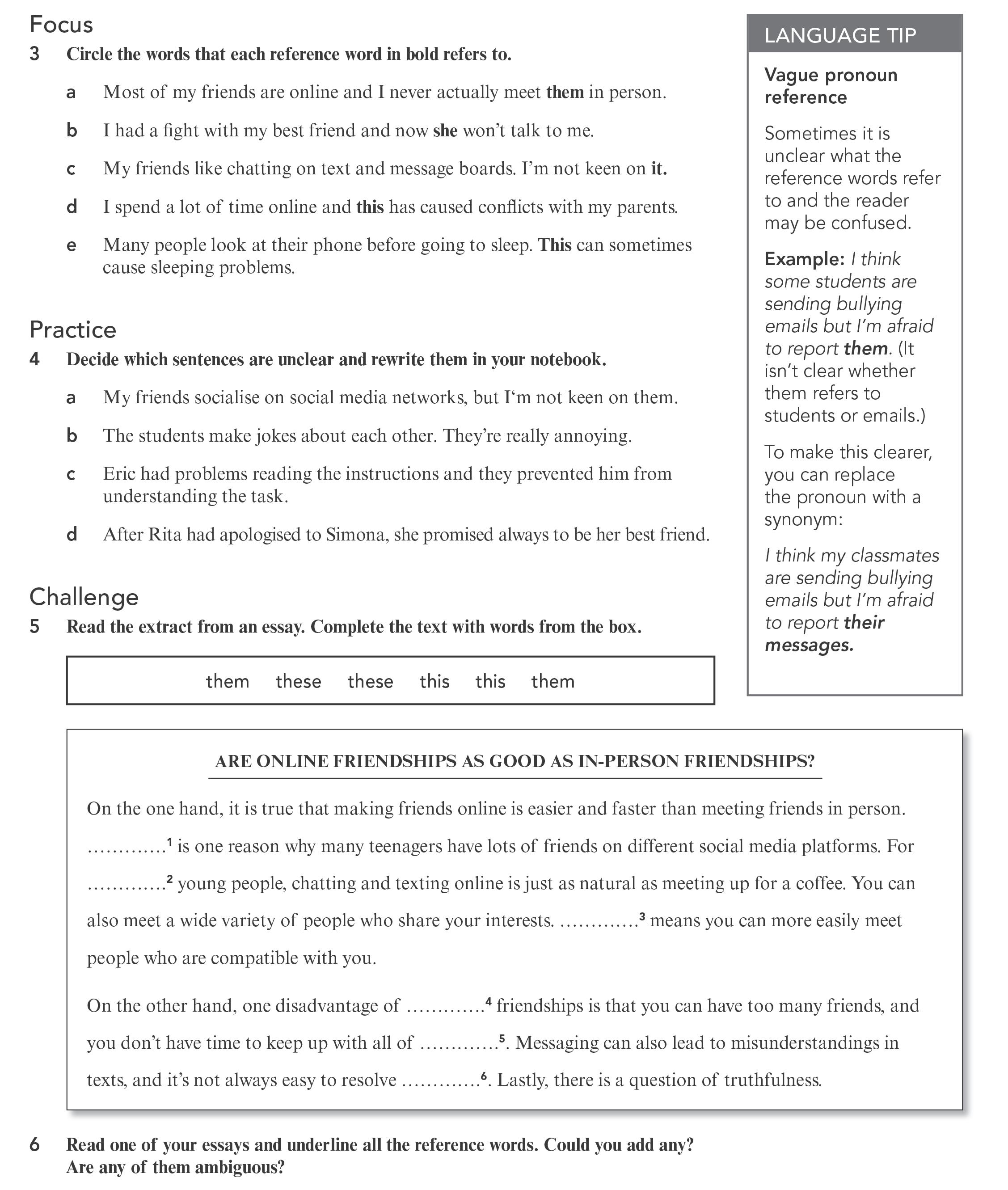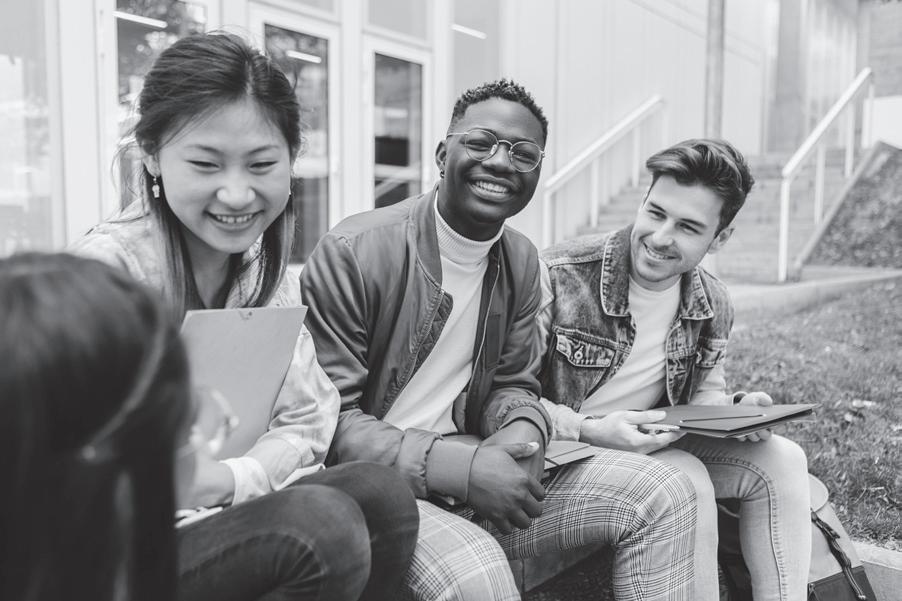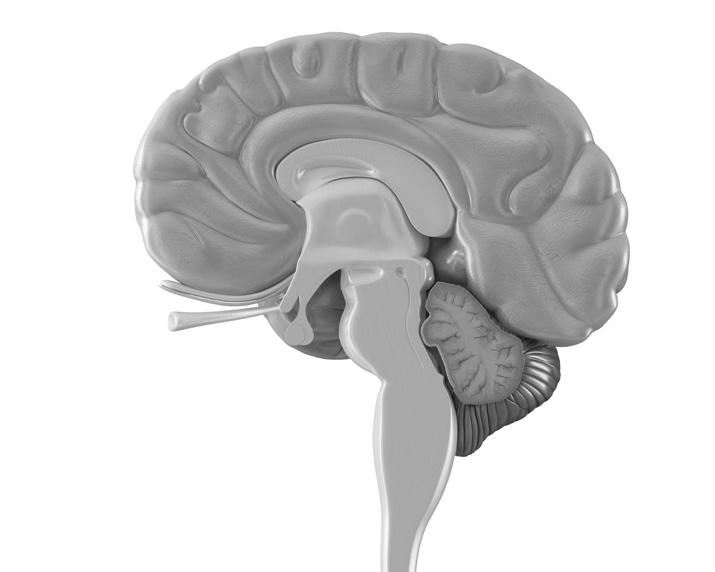SAMPLE



This Workbook provides questions for you to practise what you have learned in class. There is a unit to match each unit in your Coursebook.
Tips to help you with your learning.
When you read a text, think about the purpose of the text and the intended audience.
Information to help you find out more about grammar.
Use the Cambridge Learner Corpus to get your grammar right!

Remember to think carefully about when an action started, whether a past action has a connection to the present, if an action continued over time or is routine.
There are opportunities to practise your grammar on the Use of English pages in each unit. Each Use of English lesson is divided into three parts:


Focus: These grammar questions help you to master the basics.
Practice: These grammar questions help you to become more accurate and confident.

Challenge: These questions will help you use language fluently and prepare for the next level.
Questions that help you to think about your learning and progress.


1 Read the questions. Then complete them using words from the box. academic performance career degree entry requirements non-academic achievements peers scholarship student loan undergraduate
Here are some of the most frequently asked questions about our college courses. Don’t see your question here? Write to us and we’ll do our best to answer!
1 What are the ……………………. for getting a place at university?
2 How long does it usually take to complete a …………………….?
3 Do all ……………………. courses in science require an A level in maths?
4 How can I apply for a ……………………. to help pay for my tuition fees?
5 Can anyone get a ……………………. from a bank to pay for accommodation and living costs?
6 Are exam results and overall ……………………. the most important criteria?
7 What about things like art and sport? Are ……………………. also important?
8 How do I decide which subject to choose if I don’t know my ……………………. yet?
9 Will there be an opportunity to get the opinions of my ……………………. who already attend the university?
2 Write answers to the questions from Exercise 1 in your notebook using information about universities in your country.
3 Read the information. Then read the statements and write true, false or not given.
Here at Watson University, we are proud to maintain the very highest standards of teaching and learning. Whatever type of degree you are applying for, we provide an ideal environment to develop your potential and enable you to achieve the career of your dreams. We’ve got one of the largest selections of undergraduate courses in the country. Entry requirements vary according to the department for which you are applying. To make the most of your time with us, we encourage all students to work together with their peers to create a collaborative and supportive environment. For students who may need financial support, we recommend applying for one of our scholarships or visiting our support centre for advice about how to get a student loan. For further information, search our course information by subject or department, or visit our FAQ page to contact us with your question.
a The university prepares you for a specific job. …………………….

b The university offers a wide range of BA courses. …………………….
c Non-academic achievements are one of the entry requirements.
…………………….
d Students are encouraged to work alone. …………………….
e You can borrow money from the university. …………………….
4 Write two more questions to add to the frequently asked questions in Exercise 1.
5 Write two questions to ask the university in Exercise 3.
1 Skim the extracts and match them with the type of text. Who is the intended audience for each text?
advice article ………… book summary ………… dictionary ………… scientific article …………
a Circadian rhythm – a term used to describe physical, mental and behavioural changes related to a 24-hour cycle. Sleeping at night and being awake during the day is one example of a circadian rhythm.
b Providing a complete and concise account of the nervous system, this is the perfect resource for all students of neurobiology and provides a fascinating guide to neurodevelopmental processes and the understanding of cognition and knowledge acquisition.
c Emotions are an important of a natural adaptive biological process in adolescence. Both positive and negative emotions are necessary for this development during puberty and are important for your teenager’s growth and development into an adult. These emotions will eventually stabilise as your teen starts to mature. There is also some causal data to suggest that teens have a different circadian rhythm from adults.
When you read a text, think about the purpose of the text and the intended audience. This will help you to frame the information more easily and effectively.
d Why and how the structure of white matter changes and develops across the human lifespan is the focus of this study. Compared with grey matter, the structure of white matter, which lies beneath the brain’s surface and makes up half the human brain, has been far less frequently researched. Using new data from MRI imaging, this study aims to investigate a possible correlation between changes in white matter after doing regular physical activity and learning complex tasks.
2 Match the words in bold in the extracts with the definitions below.
a daily pattern of activity …………………….
b type of non-invasive diagnostic tool …………………….
c brain tissue beneath the surface of the brain …………………….
d brain tissue on the surface of the brain …………………….
e changes that occur as a result of evolutionary development …………………
f results that prove that one thing is caused by another …………………….
g processes of knowledge and perception in the brain …………………….
h relating to the development of the brain and the nervous system ……………
i the length of time that a person lives …………………….
j when certain attributes tend to occur together …………………….
k to become firm or steady …………………….
l when a child’s body begins to develop and mature …………………….
3 Read the article. Then complete the flowchart. Choose no more than two words from the article for each answer.
Melatonin is the naturally occurring hormone that is cyclically released as darkness approaches and prepares humans for sleep. In general, melatonin release follows approximately a 24-hour daily cycle, ideally ensuring consistent sleep patterns from day to day.
One change in the body during puberty is closely related to how you sleep. There is a shift in the timing of your circadian rhythms. Before puberty, your body makes you sleepy around 8 or 9 p.m. When puberty begins, this rhythm shifts a couple hours later. Despite getting up at 7 a.m., you may not feel fully awake until 9 or 10 a.m.
From 10 a.m. to 1 p.m., you will feel the highest point of energy of your day. Your body temperature rises and you will feel more alert. But the late night and disrupted sleep from the night before starts to kick in, and from 2 to 5 p.m. you may start to feel drowsy and long for a sugary snack or drink to stay awake.
Credit: NIGMS
Getting sleepy
Teens experience
a rise in 1 about one or two hours later than adults. You find it difficult to fall asleep and often stay up late.
The big dip
The next morning, you feel ……… 2 and you may not feel fully ……… 3 until 9 or 10 a.m.
a.m. to 7 a.m.
Your 6 drops and you feel ……… 7 .
You crave a 8 or a drink.
Energy up
Your 4 puseog and you feel alert and full of 5
USE OF ENGLISH
Hi Johannes, what are your plans after finishing school?
Johannes: I’ve been applying1 to different universities for next year. How about you?

I’ve received2 one offer of a place, but I want3 to take a year off first.
Johannes: Really? What do your parents think4 about that? They didn’t like5 the idea at first, but they’re starting6 to come round to it!
Johannes: My sister took7 a gap year before going to uni and she travelled8 all over Europe. She had never travelled9 abroad before that, and she really enjoyed10 it!
Check!
1 Match the names of the verb forms (a–f) with the infor mation (i–vi) below. Then match them with the examples in bold (1–10) above.
a The present simple i a past event that has a result in the present …………
b The present continuous ii a stative verb used to express an opinion …………
c The past simple iii an activity that started in the past and is still going on …………
d The present perfect simple iv an action or event that happened in the past before another event …………
e The present perfect continuous v an event that happened in the past and is finished ………… …………
f The past perfect vi events that are currently in progress …………
Notice
2 Read the conversation again. Answer the questions. Which verbs:
a express a connection between past and present?
b emphasise that an action or event hasn’t finished?
3 Circle the correct verb form.
a We’ve already completed / been completing all our final exams.
b My parents believe / are believing that it’s important to have a good career.
c He had / has studied several languages before he went to university.
d What are you thinking / do you think of doing next year?
e We have changed / been changing teachers three times this year!
f I have been learning / learned Japanese in school this year.
4 Four of these sentences are incorrect. Find the mistakes and correct them.
a They’ve been doing an online maths course this year.
b This is the first time I visit England.
c I am living here since last December.
d I wanted to visit the museum but I wasn’t having enough time.
e I’m usually getting good marks for my English composition.
5 Read the blog post. Complete the text with verbs from the box using the simple, continuous or perfect forms of the present or past.
begin get help join live not realise take visit
Hi! My name is Jake and I’m from Tasmania, where I ……………………………1 with my parents. At the moment, I ……………………………2 my aunt in Melbourne for a few weeks. I ……………………………3 at a wildlife refuge for the last week. My aunt ……………………………4 the refuge a few months ago, and there are volunteers from all generations. For several months, they ……………………………5 care of animals that were injured in the forest fires. We ……………………………6 hundreds of koala bears to recover and get back to the wild. Before coming to Melbourne, I ……………………………7 the full impact of climate change on wildlife, but now I ……………………………8 to understand why it is so important for everyone to work together to protect the planet.

Remember to think carefully about when an action started or finished, whether a past action has a connection to the present, whether an action continued over time or is a daily routine and whether the verb is stative or dynamic.
Examples:
We have travelled around the world for one year and are now in Nepal. (travel is an activity that continued over some time = have been travelling)
We aren’t knowing each other very well yet. (know is a stative verb that doesn’t use continuous form = don’t know)
USE OF ENGLISH
Teen problems: I feel like none of my friends really like me. What can I do?
Friendships are incredibly important when we’re growing up. They can help us feel more confident and help us to define who we are, so I can understand why this feeling is worrying you.
Friends are important, but it’s also important to choose them wisely. Are they people you can trust? What is important for you in a friendship? Are these values also important to your friends? This is one way to decide who your true friends are.

Check!
A real friend is someone who you can turn to when you have problems. These might be related to issues around bullying or negative feelings about yourself. If you can talk to them about your problems, it is one step towards true friendship.
1 Read the advice about friendship. What do the words in bold refer to?
a they .…………………………………
b this feeling .…………………………………
c them .…………………………………
d they .…………………………………
Notice
e these values .…………………………………
f this .…………………………………
g these .…………………………………
h it .…………………………………
2 Read the letter again. Match the questions below with the words in Exercise 1. Write the correct letter next to each question.
a Which words refer to a single previous noun? …………………….
b Which ones refer to some previous ideas? …………………….
c Which words refer to a noun within the same sentence? …………………….
d Which ones refer to something in a previous sentence? …………………….
e Which examples use a synonym or a paraphrase of a previous word or idea? …………………….
3 Circle the words that each reference word in bold refers to.
a Most of my friends are online and I never actually meet them in person.
b I had a fight with my best friend and now she won’t talk to me.
c My friends like chatting on text and message boards. I’m not keen on it.
d I spend a lot of time online and this has caused conflicts with my parents.
e Many people look at their phone before going to sleep. This can sometimes cause sleeping problems.
4 Decide which sentences are unclear and rewrite them in your notebook.
a My friends socialise on social media networks, but I‘m not keen on them.
b The students make jokes about each other. They’re really annoying.
c Eric had problems reading the instructions and they prevented him from understanding the task.
d After Rita had apologised to Simona, she promised always to be her best friend.
5 Read the extract from an essay. Complete the text with words from the box. them these these this this them
Vague pronoun reference
Sometimes it is unclear what the reference words refer to and the reader may be confused.
Example: I think some students are sending bullying emails but I’m afraid to report them (It isn’t clear whether them refers to students or emails.)
To make this clearer, you can replace the pronoun with a synonym:
I think my classmates are sending bullying emails but I’m afraid to report their messages.
On the one hand, it is true that making friends online is easier and faster than meeting friends in person. …………. 1 is one reason why many teenagers have lots of friends on different social media platforms. For 2 young people, chatting and texting online is just as natural as meeting up for a coffee. You can also meet a wide variety of people who share your interests. ………….3 means you can more easily meet people who are compatible with you.
On the other hand, one disadvantage of ………….4 friendships is that you can have too many friends, and you don’t have time to keep up with all of ………….5. Messaging can also lead to misunderstandings in texts, and it’s not always easy to resolve ………….6
6 Read one of your essays and underline all the reference words. Could you add any? Are any of them ambiguous?
1 These are some useful words for presenting different views on a topic. Complete the sentences with words from the box.
agree argued believe evident extent hand other view
a It could be ……………………. that young children should not use computers at an early age.
b On the one ……………………., there are some advantages to having older siblings.
c On the ……………………. hand, some children can feel they don’t get enough attention.
d It is difficult to ……………………. how many students experience bullying online.
e Having longer school holidays may be beneficial to a certain
f It is true that social media is an important way for people to stay in touch. This is ……………………. in the amount of time they spend on their phones.
g I would ……………………. that many students are motivated by learning online.
h Some people hold the ……………………. that young people should have more free time and less homework.
2 Read the essay question. Which response agrees or disagrees with the question? Then write your opinion in one sentence.
Some people think that young people today are much more used to using technology than previous generations and that that is why there is a communication gap between younger and older generations. Others believe that communication between the generations has always been more challenging. Discuss both sides of the question and give your opinion.
a Communicating on social media is so different nowadays, so it is not surprising that older and younger people find it difficult to communicate. …………………….

b Younger and older generations communicate in different ways, but it’s not because of technology. …………………….
Your opinion:
Writing a discussion essay
A discussion essay question asks you to set out the two sides of a specific issue. You will be expected to present arguments for each side of the issue equally, with evidence to support each one. Then state your own opinion in the conclusion.
3 Read the essay question. Then copy and complete the graphic organiser with your ideas about the topic. Consider the questions in the box to help you. All parents want their children to have a successful future. Some people think that schools should teach life skills, such as planning a budget or developing self-esteem. Others believe that only academic subjects that help students to pass exams should be taught. Discuss both sides of the issue and give your opinion.
How do we know what life skills are going to be useful in the future?

Will students be motivated to learn life skills or will they think it is a waste of time?
Are life skills something students can learn on their own?
Who will teach life skills to students if they don’t learn them at school?
Will teaching life skills take up valuable time that could be spent on exam preparation?
Do:
• provide examples and explanations
• use signpost phrases to connect your ideas
• use reference words to create a cohesive text.
Don’t:
• use informal language
• include irrelevant information
• stray from the main topic.
4 Now decide your opinion and choose one of these statements for your conclusion to the essay question in Exercise 3. Complete the conclusion with your main idea.
a Although learning a range of academic subjects is important for students, I feel that …………………….…………………….…………………….…………
b Although learning life skills is important for students, I think it is more important for them to …………………….…………………….………………
5 Write the rest of your essay in your notebook. Remember to use academic language for discussing both sides of a topic.
1 Circle the correct answers.
a Students with high grades can sometimes apply for a …………… to help pay their college fees.
A scholarship
B career
C qualification
b Students who are the same age and level as you are your ……………
A colleagues
B peers
C partners
c If you take out a loan, it means that you …………… money.
A give
B lend
C borrow
d Good exam results at school are usually part of the college entry ……………
A achievements
B requirements
C performance
e White and grey matter are two types of …………… in the brain.
A cell
B tissue
C nerve
f An MRI is a type of ……………
A treatment
B diagnosis
C diagnostic tool
g Behaviour that is affected by daylight is known as the circadian ……………
A rhythm
B circle
C pattern
h Puberty is the time of life between the ages of ……………
A 5 and 10
B 8 and 12
C 8 and 14
2 Circle the correct words to complete the text.
I’m thinking / think 1 of going to college next year.
So far I’ve been visiting / have visited 2 three different colleges. Most of them are having / have 3 regular open days for school students and their parents to come and look around. On our last visit, a university student has led / was leading 4 the tour and showed / was showing 5 us the library, the computer centre and the student cafeteria. I think you’re expected to be quite independent at uni and this / they 6 means that you need to be very motivated and not rely on the teachers too much. They / These 7 can help you if you have a specific question, but you can also go to the academic support centre for more general issues. These / This 8 can range from help with academic study skills to managing your budget.
3 Skim the paragraph and decide who the intended audience is.
The human brain starts to develop before birth and continues developing throughout childhood and adolescence into adulthood. The rate of brain development is not consistent over this period of time – it varies greatly according to the individual and their environment. Therefore, it is unrealistic to expect all children to develop at the same rate all the time or at the same pace as their peers. By developing strategies for offering flexibility and accommodating variability, we can facilitate better brain development for all children.

This extract is from an article for:
A teachers and educators
B doctors and brain surgeons
C health and nutrition experts
4 Which statement best corresponds with the ideas in the text in Exercise 3?
A We should consider carefully how to evaluate each child’s development.
B We should not have unrealistic expectations of children’s brain development.
C Brain development should be included in the school curriculum.
Write answers to these questions in your notebook.
a How did you go about learning and remembering new vocabulary items from this unit? Which method do you feel worked the best?
b Which grammar points in this unit do you feel you need to study more carefully? How could you study them?
5 Use phrases from the box to write your responses to the questions in your notebook.
As far as I’m concerned
From my point of view
I’d definitely / probably say that
There’s no doubt in my mind
a Do you think academic performance is more important than non-academic achievements, or are they both equally important?
b Do you think it is important to study the brain? How can such studies help us?
c How important are friendships in your life? What in your opinion makes a good friendship?
6 Read the essay question and underline the key words. Write a plan for a discussion essay in your notebook. Some parents send their children to after school classes to help them improve their exam grades. Other parents think that children should enjoy their free time with their friends. Discuss both views and give your opinion.
c How easy was it for you to decide your opinion of topics in this unit? Which topic was most difficult to express an opinion about? Why?
d How did you write your notes when planning your ideas for an essay? Think of three different ways you could lay out your ideas in your notebook.
e What did you learn about collaborating with others through your work in this unit? What did you do well?